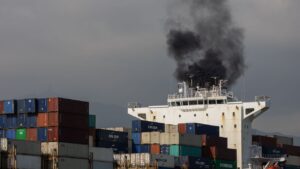Maritime Regulator Sets Carbon Measures facing discord
Summary:
The continuous global clamor for attention towards the ship’s carbon emission has pushed the International Maritime Organization to take measures to reduce pollution caused by ships. The IMO will also research market-based incentives for the purpose of adopting such mechanisms by 2024.
Content:
To face the rising pressures from the government and its own ranks over environmental goals, The IMO has adopted a new plan after the initial plan taken in 2018. Among other things; the plan includes the measurement of the carbon intensity of the ocean-going vessels. Carbon intensity is the measurement of the carbon emission of a ship linked to the volume of the cargo moved over a voyage. However, the plan does not include any specific targets for reducing carbon emissions.
To set any specific target has been postponed till 2023. The plan, however, now includes a requirement to measure how much greenhouse gasses a ship emits and rate its performance.
The idea behind this plan is to urge the ship-owners to improve about 30000 ocean-going vessels’ carbon intensity by at least 40% by 2023 and cut the emission cut by half by 2050 compared to the levels of 2008, according to a spokesman for the United Nations regulator.
According to Lars Robert Pedersen, Deputy Secretary-General of Denmark Based shipping Trade Bimco, the measurement is a little doubtful as per its effectiveness and target to reach the CO2-cut goals, but was necessary to keep it on run.
However, the plan that aims to lower the carbon intensity by 2% annually from 2023 to 2026 or a total of 8% compared to 2019 levels has been facing much criticism from U.S and EU. U.S urged for a much higher reduction of 22% by 2026, as said by IMO delegates and unhappy about the fact that no target had been set for 2027 to 2030. On the other hand, the EU thinks, the plan does not go far enough and assured a legislative development by the EU later this year.
The idea of the development of the infrastructure of cleaner alternative fuels has been criticized by several IMO member nations including Brazil, Argentina, Chile. They fear that the rapid shift in the industry operations might be costly and harm their export-driven economics.
But there is a lot of willingness in the market-based incentives because the market can support cleaner ships and help the developing nations fund their set-up for better fuels. So, the IMO will look into the proposal and discuss the issue in November this year
Pic and writing source:
https://www.wsj.com/articles/maritime-regulator-sets-carbon-measures-amid-dissent-11623785039?mod=djemlogistics_h


Leave a Reply